Tag: authors
Minority report
20 February 2014 | Reviews
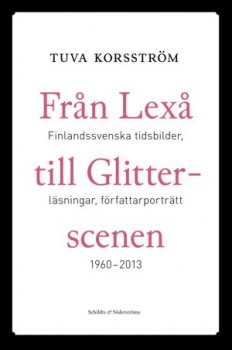 Tuva Korsström
Tuva Korsström
Från Lexå till Glitterscenen. Finlandssvenska tidsbilder, läsningar, författarporträtt 1960–2013
[From Lexå to the Glitter Scene. Finland-Swedish period pieces, readings, portraits of authors 1960-2013]
Helsinki: Schildts & Söderströms, 2013. 529 pp., ill.
ISBN 978-951-52-3224-3
€37.90, hardback
The only thing unequivocally separating the Swedish minority in Finland from the Finnish majority is language. Therefore the word – be it written, spoken, sung – has always occupied a privileged position amongst Finland-Swedes. This has resulted in a richness of literature and mass media, which is surprising for a minority that today numbers fewer than 300,000 people, or just over five per cent of the population. For Swedish language literature in Finland – the topic of Tuva Korsström’s book Från Lexå till Glitterscenen. Finlandssvenska tidsbilder, läsningar, författarporträtt 1960–2013 – the period following the Second World War has been a success history.
The strength and force of this literature has manifested itself in many ways: through an increasing professionalisation of the writing community, through a steady stream of new writing talent, and through increased diversification, both in terms of regions and genres. In competition for major national and Nordic prizes, such as the Finlandia Prize for Fiction, the Runeberg Prize, and the Nordic Council Literature Prize, Finland-Swedish books have been strong contenders, and authors [see the list] such as Tove Jansson, Märta Tikkanen, Bo Carpelan, Kjell Westö, and Monika Fagerholm have gained large audiences, both nationally and internationally. More…
Coffee with a twist
13 February 2014 | This 'n' that
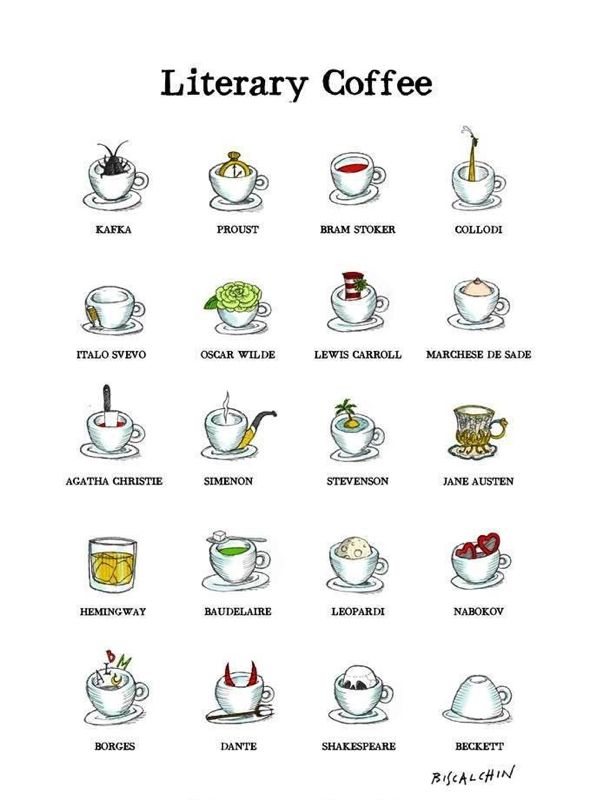
The Italian food illustrator and artist Gianluca Biscalchin combines authors and coffees in this picture: an amusing quiz for any friend of literature. (We think Beckett is particularly incisive.)
One could try out the same method adapted to Finnish authors; it first comes to mind that there are names that would work the same way as Hemingway here. Pentti Saarikoski, the hard-drinking literary enfant terrible of the 1960s and 1970s (1937–1983), for example.
The comic writer Arto Paasilinna (born 1942; very popular in translation in Italy, by the way), surely, would have a pair of hare’s ears sticking out of his cup (his most-translated novel is Jäniksen vuosi, The year of the hare – L’anno della lepre).
The prolific lyric modernist, playwright and author Paavo Haavikko (1931–2008), would have a leafy tree in his cup, as one of his best collections of poetry is entitled Puut, kaikki heidän vihreytensä (‘The trees, all their green’).
And of course: out of Tove Jansson’s cup a moomintroll or a hemulen would peep out!
In memoriam Anselm Hollo 1934–2013
1 February 2013 | In the news
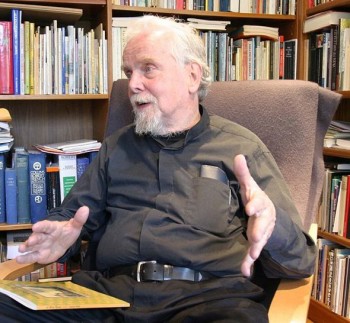
Anselm Hollo. Photo: Gloria Graham; taken during the video taping of Add-Verse, 2005. (Wikipedia)
Poet and translator Anselm Hollo died in Boulder, Colorado, on 29 January, at the age of 78. His father, Professor J.A. Hollo, translated literature from 14 languages. Anselm, born in Helsinki in 1934, worked with languages all his life, translating from Finnish, English, German, Swedish and French.
In the 1950s he lived in Germany and Austria, and then moved to England to work for the BBC. He published his first collection of poems, Sateiden välillä (‘Between rains ’), in Finnish in 1956. He once said that as a poet he ‘makes things in and out of language’.
In the late 1960s Anselm moved to the United States, where he was to write more than 30 books in English. He was a Professor of Writing and Poetics at Naropa University in Boulder, where he lived with his second wife, the visual artist Jane Dalrymple-Hollo. His own poetry is influenced by the 1950s and 1960s Beat Generation, among whom he had several personal friends; he translated Allen Ginsberg and Robert Creeley into Finnish – as well as the two books of poetry by John Lennon.
His last work remains Guests of Space (Coffee House Press, 2007). Notes on the Possibilities and Attractions of Existence: New and Selected Poems 1965–2000 received the San Francisco Poetry Center’s Book Award for 2001. His collection Corvus (2002) was also published in Finland, translated by Kai Nieminen. Among the many literary prizes he received was the Finnish Government Prize for the Translation of Finnish Literature in 1996.
Among his best-known translations of Finnish poetry are poems by Pentti Saarikoski (1937–1983) and Paavo Haavikko (1931–2008), whose work he also translated into German. For many years he served as a member of the literary advisory board of Books from Finland, and translated new work by, for example, Lassi Nummi, Jarkko Laine, Rosa Liksom, Leena Krohn and Riina Katajavuori.
During Anselm and Jane’s visits to Finland it was always enjoyable to talk about literature, art, new books and translation over a glass of wine. Anselm rarely, if ever, said no to requests to translate something: he remained sincerely interested in his native language and the ways it was used for creating fiction. We miss a jovial friend and an exceptionally skilful man of letters.
![]()
i.m. Hannes Hollo, 1959–1999
by Anselm Hollo
(Hannes Hollo was his son from the first marriage with poet Josephine Clare)
Fought the hungry ghosts here on Earth
‘What is man?’ asked the King
Alcuin’s reply: ‘A guest of space.’ And time yes time:
The past lies before us, the future comes up from behind
Walking on Primrose Hill or Isle of Wight beaches
Iowa City streets scrambling up snow-covered deer track
To Doc Holliday’s grave in Glenwood Springs
His helmet now shall make a hive for bees
He fought the hungry ghosts here on Earth
Strong & resourceful on his best days,
Patient kind and presente
Returning those with him to here & now
But just as we settle in with our Pepsi and popcorn
THE END rolls up too soon always too soon
![]()
(Anselm reads the poem here)
Lassi Nummi in memoriam 1928–2012
16 March 2012 | In the news
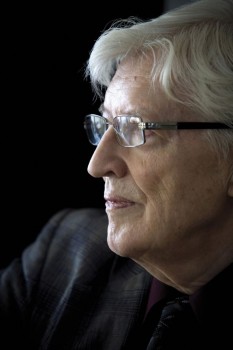
Lassi Nummi. Photo: Jouni Harala
Poet and author Lassi Nummi died on 13 March at the age of 83.
His first collection of poems, Intohimo olemassaoloon (‘A passion for existence’) appeared in 1949. Nummi worked as a journalist, chairman of the Finnish PEN Club and as a member of the Bible translation committee.
Nummi published a couple of prose works and more than two dozen collections of poems; in an interview by Tarja Roinila* he said he was ‘a prose writer who has strayed into poetry’ and that he regarded himself ‘a fairly old-fashioned poet’.
Nummi attempted to find a synthesis between traditionalism and modernism – the prevailing ‘ism’ in the 1950s Finland – and wrote both metrical, traditional and speech-like, free verse.
Religious, philosophical and existential themes are found in his poetry, strongly featuring imagery of nature, music and travelling. His poems have been translated into six languages.
Nummi’s two sons, Markus and Ilari, became artists as well – Markus, an author, Ilari, a filmmaker.
Above and through everything
Above and through everything
the thin web of life. On an evening like this,
its strands
are stretched to breaking
under the moment’s significange, the light’s
weight. So much empty space,
so much lovely desolation
freed from significance
in us, in the world,
it makes you grow faint.
And here, all dreams have to be dreamed by oneself!
When I am dead, a stone
will dream my dreams.
From Hengitys yössä (‘Breathing in the night’, 1995), translated by Anselm Hollo , *) published in Books from Finland 1/1998
In memoriam Bo Carpelan 1926–2011
24 February 2011 | Authors, In the news
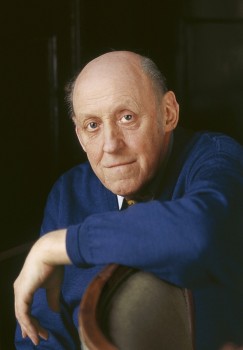
Bo Carpelan. Photo: Irmeli Jung
I write one winter’s day,
write off the day and the night, the planets,
go into my house from a harsh sun
and extend those shadows that are swordlike aimed.
It is a day of drifting snow
and with a voice from that which is I
or was.
(From The Cool Day. English translation by David McDuff, published in Homecoming, Carcanet, 1993)
Bo Carpelan, one of the great names of Finnish literature, died in his home city of Helsinki on 11 February. Carpelan’s first collection of poetry appeared in 1946, his last in 2010.
In his poems and prose he frequently described his childhood in apartment buildings filled with the smell of cooked herring, the noise of quarrels and the sound of the news on the radio. Prosaic life is turned into poetry, images and music, the apartment house is built from the rooms of a dream.
Bo Carpelan loved music. His novel Axel (English translation by David McDuff, 1989), is about his paternal grandfather’s brother, who was a friend of Jean Sibelius and the composer’s first critic. Axel was an unsuccessful musician who chose to live through someone else, and Carpelan relates him to the theme of the dignity of rejected human beings. More…
-
Monthly archive
-
Yearly archive
-
Search our archives
-
You can search for texts using author names or free search terms.
Find texts matching either just one search term (OR query) or require all words to appear (AND query). Use quotes when searching for phrases, for example "search phrase".
-
© Writers and translators. Anyone wishing to make use of material published on this website should apply to the Editors.
